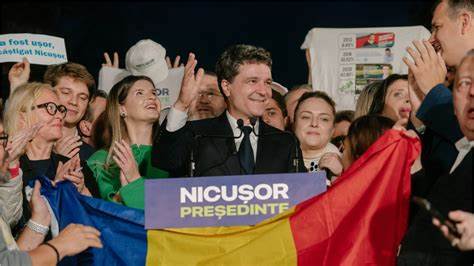by Temitope Oladeji
19/5/2025
In a surprising turn of events, Bucharest’s centrist mayor, Nicușor Dan, secured victory in Romania’s presidential election, defeating far-right nationalist George Simion, a vocal admirer of United States President Donald Trump.
Official results from nearly all polling stations show Dan, 55, capturing approximately 54% of the vote, while Simion garnered around 46%, in a contest that drew the highest voter turnout in 25 years among Romania’s 19 million citizens.
Dan, a soft-spoken mathematician and anti-corruption advocate, surged ahead in the final days of the campaign after trailing for weeks behind Simion, who had proposed a radical shift in Romania’s foreign policy, including ending military support for Ukraine.
Simion had led the first round of voting two weeks ago with 41% of the ballots but conceded defeat late Sunday, despite earlier declaring victory in a premature social media post.
The newly elected Romanian President ran on a platform promising to uphold democratic institutions, maintain Romania’s strategic alliances with the EU and NATO, and continue support for Ukraine, in which Romania has played a pivotal logistical role during its ongoing war with Russia.
Supporters of the new president gathered in central Bucharest, chanting, “Russia, don’t forget, Romania isn’t yours,” reflecting widespread concerns about Russian influence in the region.
In his victory address, Dan struck a sober tone, acknowledging the challenges ahead. “There will be a difficult period ahead, necessary for economic rebalancing to lay the foundations of a healthy society. Please have hope and patience,” he told supporters.
Dan now faces the complex task of forming a government and securing a parliamentary majority to implement fiscal reforms.
Romania is currently grappling with the highest budget deficit in the European Union, and analysts warn of possible credit rating downgrades unless swift action is taken.
The newly elected president emphasized the importance of continuing Romania’s support for Ukraine as a matter of national security.
His position was echoed by Ukrainian President Volodymyr Zelensky, who congratulated Dan on his “historic victory,” stating: “For Ukraine as a neighbour and friend, it is important to have Romania as a reliable partner.”
The vote took place on the same day as the first round of Poland’s presidential election, where liberal candidate Rafal Trzaskowski edged ahead of nationalist Karol Nawrocki, backed by the Law and Justice (PiS) party.
Both elections are being closely watched across Europe amid growing concern over rising nationalist sentiments, economic instability, and internal EU cohesion in responding to Russian aggression.
The Romanian election had originally been scheduled months earlier but was delayed following allegations of Russian interference that favored far-right candidate Calin Georgescu.
Georgescu was later barred from running, but Simion, who pledged to appoint him prime minister if elected, capitalized on his popularity among nationalist voters.
Romania’s presidency holds substantial authority, including chairing the Supreme Council of National Defence and overseeing the country’s foreign policy.
The president also holds veto power over key EU decisions that require unanimous approval.
Political observers warned that a Simion presidency could have strained Romania’s Western alliances, diminished foreign investment, and destabilized NATO’s eastern flank.
His election would have likely aligned Romania more closely with Hungary’s Viktor Orbán and Slovakia’s Robert Fico, both of whom oppose military aid to Ukraine and maintain warmer ties with Moscow.
Instead, Dan’s victory is seen by many as a reaffirmation of Romania’s pro-European trajectory and its commitment to democratic values, security cooperation, and regional stability.

